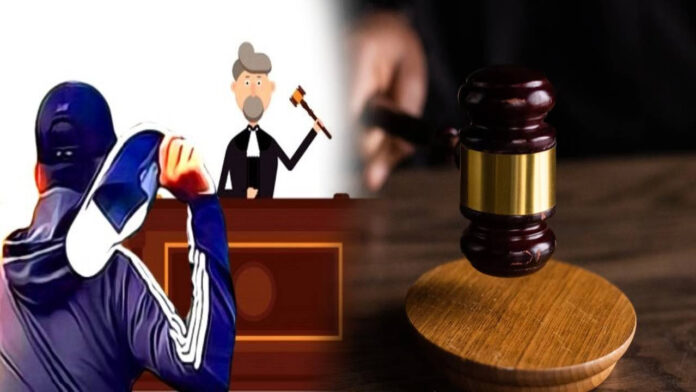A 22-year-old murder accused, identified as Kiran Santosh Bharam, shocked the courtroom on Monday by hurling a slipper at the presiding judge during a session at the Kalyan Sessions Court in Thane district, Maharashtra. The incident reportedly stemmed from Bharam’s frustration over his lawyer’s absence, leading to a chaotic turn of events.
What Happened in the Courtroom?
The dramatic incident occurred during a hearing presided over by District and Additional Sessions Judge R.G. Waghmare. Bharam, facing murder charges, requested the judge to transfer his case to another court. The judge instructed him to file a formal application through his lawyer. However, when the lawyer’s name was called, there was no response, as the lawyer was absent from the proceedings.
In response, Judge Waghmare asked Bharam to either provide the name of a new lawyer or proceed with his existing representation. A fresh hearing date was then assigned to ensure a smooth continuation of the trial.
At this point, an irate Bharam reportedly removed a slipper and flung it in the judge’s direction. The slipper missed its mark and struck a wooden frame near the judge’s dais before falling by the side of the bench clerk.

Legal Repercussions for Bharam
The court authorities swiftly took action against Bharam for his disruptive behavior. A First Information Report (FIR) was registered against him under the newly implemented Bharatiya Nyaya Sanhita (BNS). The charges include:
- Section 132: Assault or use of criminal force to deter a public servant from discharging their duty.
- Section 125: Acts endangering the life or personal safety of others.
The incident highlights the growing concerns over maintaining courtroom decorum and ensuring the safety of judicial officers.
Details of the Accused and the Case
Kiran Santosh Bharam, who is already facing murder charges, was visibly agitated over the absence of his lawyer during the hearing. Court officials revealed that Bharam had specifically requested a transfer of his case to another court, citing dissatisfaction. The lack of immediate legal representation further escalated his frustration, culminating in the violent outburst.
This behavior not only disrupted the court proceedings but also raised serious questions about the management of accused individuals during trials. Court staff promptly intervened, ensuring the situation did not escalate further.

Courtroom Safety and Judicial Decorum
Incidents like these underscore the importance of safeguarding the dignity and authority of the judiciary. Judicial officers often face challenging situations, especially when dealing with volatile cases. This episode serves as a reminder of the pressing need for stringent measures to prevent such occurrences.
Courtrooms are sacred spaces where the rule of law prevails. Acts of aggression, like hurling objects at judicial officers, not only disrupt proceedings but also undermine public confidence in the judicial system. Legal experts have pointed out that the charges under the BNS are crucial in deterring such acts and upholding the sanctity of courtrooms.
Moving Forward
The court has taken a firm stance against Bharam’s behavior. Legal experts believe that such incidents, if unchecked, could set a dangerous precedent. With the FIR lodged and charges framed under the Bharatiya Nyaya Sanhita, Bharam faces additional legal consequences beyond the murder case he is currently embroiled.
This incident also serves as a wake-up call for judicial and administrative authorities to review safety protocols and ensure smooth functioning in courtrooms. Measures such as enhanced security and stricter enforcement of courtroom etiquette are being discussed.
Final Outlook
The slipper-throwing incident at the Thane Sessions Court highlights the fragility of courtroom dynamics when tempers flare. While Bharam’s actions were undoubtedly condemnable, they have prompted a much-needed conversation about legal representation, courtroom security, and the broader challenges faced by the judiciary in maintaining decorum.
As Bharam awaits the next hearing, this case stands as a stark reminder of the critical importance of preserving respect for the judiciary and ensuring that justice is administered without disruption.

